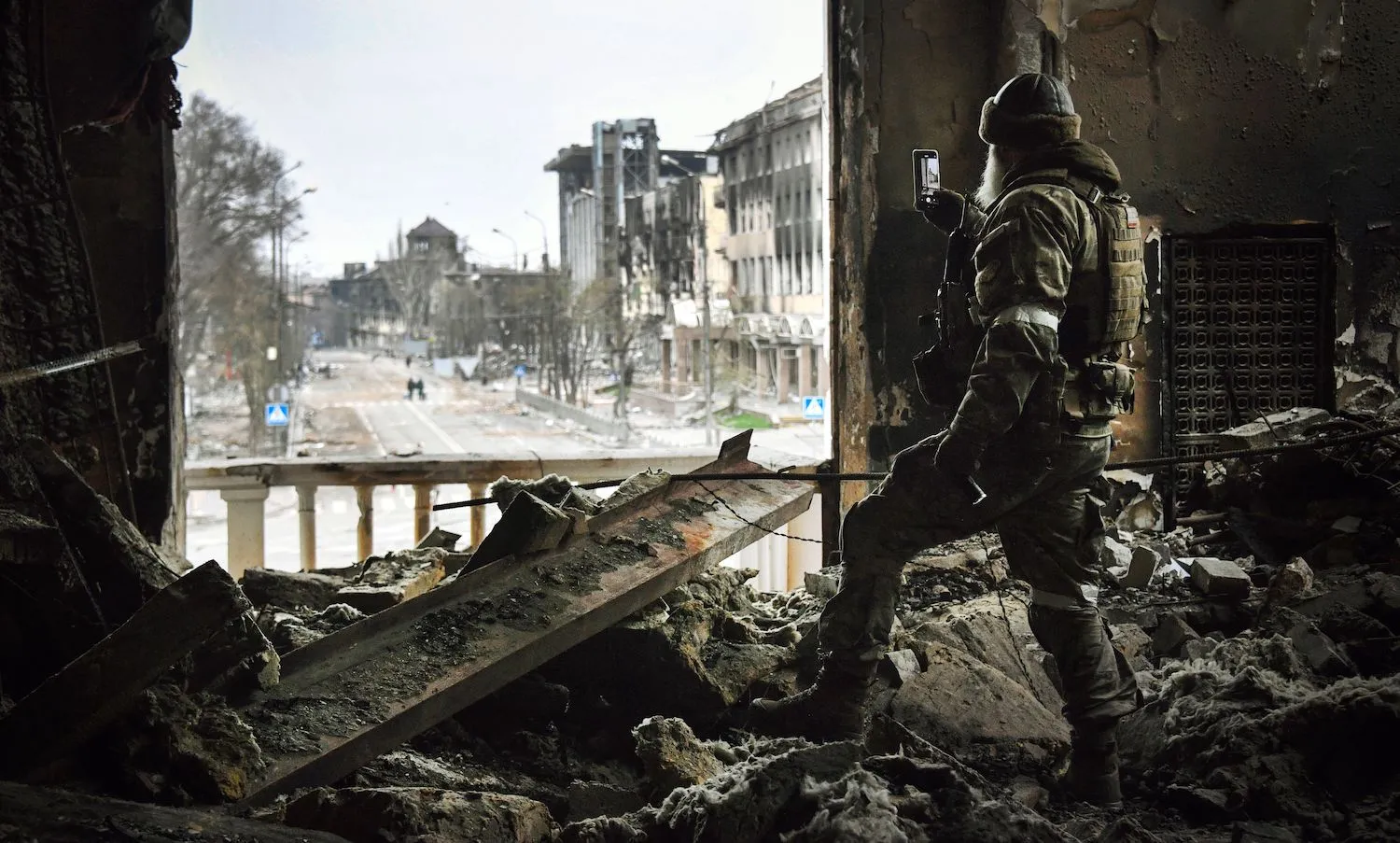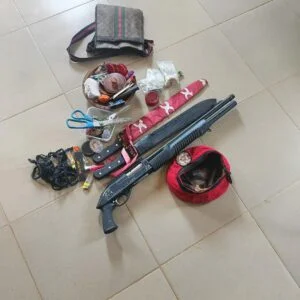Crime
US and Germany Agree to Supply Advanced Weapons to Ukraine

By Derrick Bangura
The U.S. and Germany pledged Wednesday to equip Ukraine with some of the advanced weapons it has long desired for shooting down aircraft and knocking out artillery, as Russian forces closed in on capturing a key city in the east.
Germany said it will supply Ukraine with up-to-date anti-aircraft missiles and radar systems, while the U.S. announced it will provide four sophisticated, medium-range rocket systems and ammunition.
The U.S. is trying to help Ukraine fend off the Russians without triggering a wider war in Europe. The Pentagon said it received assurances that Ukraine will not fire the new rockets into Russian territory.
The Kremlin accused the U.S. of “pouring fuel on the fire.”
Western arms have been critical to Ukraine’s success in stymieing Russia’s much larger and better-equipped military, thwarting its effort to storm the capital and forcing Moscow to shift its focus to the industrial Donbas region in the east.
But as Russia bombards towns in its inching advance in the east, Ukrainian President Volodymyr Zelenskyy has repeatedly pleaded for more and better weapons and accused the West of moving too slowly.
Andriy Yermak, the head of the Ukrainian president’s office, hailed the new Western weapons.
“I’m sure that if we receive all the necessary weapons and strengthen the efficient sanctions regime we will win,” he said.
The new arms could help Ukraine set up and hold new lines of defense in the east by hitting back at Russian artillery pieces that have been battering towns and cities and by limiting Russian airstrikes, said retired French Gen. Dominique Trinquand, a former head of France’s military mission at the United Nations.
“The NATO countries — the European nations and the Americans — have progressively escalated the means that they are putting at Ukraine’s disposal, and this escalation, in my opinion, has had the aim of testing Russian limits,” he said. “Each time, they measure the Russian reaction, and since there is no reaction, they keep supplying increasingly effective and sophisticated weaponry.”
Military analysts say Russia is hoping to overrun the Donbas before any weapons that might turn the tide arrive. It will take at least three weeks to get the precision U.S. weapons and trained troops onto the battlefield, the Pentagon said. But Defense Undersecretary Colin Kahl said he believes they will arrive in time to make a difference in the fight.
The rocket systems are part of a new $700 million package of security assistance for Ukraine from the U.S. that also includes helicopters, Javelin anti-tank weapon systems, radars, tactical vehicles, spare parts and more.
The rockets have a range of about 50 miles (80 kilometers) and are highly mobile. Ukraine had pushed unsuccessfully for rockets with a range of up to 186 miles (300 kilometers).
Kremlin spokesman Dmitry Peskov said Moscow does not trust assurances that Ukraine will not fire on Russian territory. “We believe that the U.S. is deliberately and diligently pouring fuel on the fire,” he said.
Col. Gen. Mikhail Mizintzev later went further, directly accusing Ukraine of planning to fire U.S.-provided missiles from the northeastern Sumy region at border areas in Russia. The claim, which he said was based on radio intercepts, couldn’t be independently confirmed.
Russian Foreign Minister Sergey Lavrov said Ukraine’s push for more weapons is a “direct provocation intended to draw the West into the fighting.” He warned that the multiple rocket launchers would raise the risk of an expanded conflict.
“Sane Western politicians understand those risks well,” he said.
As the new weapons shipments were announced, a Russian missile hit rail lines in the western Lviv region, a key conduit for supplies of Western weapons and other supplies, officials said. Regional Gov. Maksym Kozytskyy said five people were wounded in Wednesday’s strike, and the head of Ukrainian railways said the damage was still being assessed.
Germany’s promise of IRIS-T air defense systems would mark the first delivery of long-range air defense weapons to Ukraine since the start of the war. Earlier deliveries of portable, shoulder-fired air defense missiles have bolstered the Ukrainian military’s ability to take down helicopters and other low-flying aircraft but didn’t give it enough range to challenge Russia’s air superiority.
Germany has come under particular criticism, both at home and from allies abroad, that it isn’t doing enough. German Chancellor Olaf Scholz told lawmakers that the IRIS-T’s surface-to-air missiles are the most modern air defense system the country has.
“With this, we will enable Ukraine to defend an entire city from Russian air attacks,” he said. The radar systems will also help Ukraine locate enemy artillery.
A regional governor said Russian forces now control 80% of Sievierodonetsk, a city that is key to Moscow’s efforts to complete its capture of the Donbas, where Ukrainian forces and Russian-backed separatists have fought for years and where the separatists held swaths of territory even before the invasion.
Luhansk Gov. Serhiy Haidai said Russian troops were advancing in the city during fierce street battles with Ukrainian forces, though he noted that in some districts the Ukrainian troops managed to push them back.
The only other city in Luhansk that the Russians have not yet captured, Lysychansk, is still fully under Ukrainian control, he said, but is likely to be the next target. The two cities are separated by a river.
“If the Russians manage to take full control over Sievierodonetsk within two to three days, they will start installing artillery and mortars and will shell Lysychansk more intensively,” Haidai said.
Zelenskyy, meanwhile, said the country is losing between 60 and 100 soldiers a day in the fighting.
He turned the focus to children in his nightly video address, saying 243 of them have been killed in the war, 446 have been wounded and 139 are missing. The real numbers could be higher, he added, as his government doesn’t have a full picture of areas under Russian occupation.
Zelenskyy also said 200,000 children are among the Ukrainians who have been forcefully taken to Russia and dispersed across that vast country: “The purpose of this criminal policy is not just to steal people but to make those who are deported forget about Ukraine and unable to return.”
In southern Ukraine, a regional governor sounded a more positive note, saying Russian troops were retreating and blowing up bridges behind them.
“They are afraid of a counterattack by the Ukrainian army,” Vitaliy Kim, governor of the Mykolayiv region, said on the Telegram messaging app.
Crime
Police Foil Cult Initiation in Anambra, Arrest Six Suspects

The Anambra State Police Command has foiled a cult initiation ceremony in Nawfia, Njikoka Local Government Area of the state.
Spokesperson for the Command, SP Tochukwu Ikenga, disclosed this in a statement issued on Tuesday in Awka.
According to Ikenga, the operation was carried out by police operatives around 9:30am on June 15, leading to the arrest of six suspects at the scene.
Recovered during the raid were one Jojef pump action gun, two cartridges, and a golden-coloured Lexus SUV with registration number ATN 202 AE. Other items found include two cutlasses, two scissors, a cap bearing the inscription of the Supreme Vikings Confraternity, charms, and substances suspected to be hard drugs.
“They are currently undergoing police interrogation to get more insight into their modus operandi, after which the case will be charged to court on the conclusion of the investigations,” Ikenga stated.
The police spokesperson reassured residents of the command’s unwavering commitment to fighting cultism and other related crimes across the state.
Crime
Court remands 2 over alleged attempted murder

An Ikeja Magistrates’ Court, Lagos, on Wednesday, remanded two persons, Olaitan Fasasi and Kehinde Tobiloba in a correctional facility over alleged attempted murder.
Fasasi, 40, and Tobiloba, 26, whose addresses were not provided, are being charged with conspiracy, attempted murder and membership of a secret society.
The Magistrate, Mr L.A Owolabi, did not take the plea of the defendants for want of jurisdiction.
Owolabi directed the police to forward the case file to the Director of Public Prosecution for legal advice.
He thereafter adjourned the case until May 31 for mention.
The Prosecutor, Josephine Ikhayere, told the court that the defendants committed the offences at about 5.02p.m on Feb. 15, at Mushin, Lagos.
She said that Fasasi, Tobiloba and others now at large, attempted to commit murder by shooting at a resident, Alfred Ademola.
“They armed themselves with a locally made gun. They belong to Eiye Confraternity, a group proscribed by law,”, she said.
Ikhayere said that the offences contravened Sections 230(1) and 411 of the Criminal Law of Lagos State, 2012.
He said that the actions of the defendants also contravened Section 2(3)(a)(b)(c)(d) of the unlawful societies and Cultism Law of Lagos State Law.
Crime
Man jailed 3 months for stealing mobile phone

An Area Court in Jos, on Tuesday, sentenced one Jeptha John, to three months imprisonment for stealing a Redmi mobile phone valued at N165, 000.
The judge, Shawomi Bokkos, sentenced the John after he pleaded guilty to the offence.
The judge, however, gave the convict an option to pay N20, 000 fine and N50, 000 restitution to the complainant.
Bokkos said that if the convict defaulted in paying the restitution, three months should be added to his sentence to make it six months imprisonment.
Earlier, the police prosecutor, Insp Monday Dabit, told the court that the case was reported at the B Division Police Station, Jos, on Dec. 1, 2024, by Ms Nerat Danjuma.
He said that the complainant alleged that the defendant trespassed into her house and stole her mobile phone valued at N165, 000.
The prosecutor further told the court that the offence contravened the Plateau State Penal Code, Law of Northern Nigeria.
-

 Headlines4 years ago
Headlines4 years agoFacebook, Instagram Temporarily Allow Posts on Ukraine War Calling for Violence Against Invading Russians or Putin’s Death
-

 Headlines4 years ago
Headlines4 years agoNigeria, Other West African Countries Facing Worst Food Crisis in 10 Years, Aid Groups Say
-

 Foreign3 years ago
Foreign3 years agoNew York Consulate installs machines for 10-year passport
-

 News1 year ago
News1 year agoZero Trust Architecture in a Remote World: Securing the New Normal
-

 Entertainment3 years ago
Entertainment3 years agoPhyna emerges winner of Big Brother Naija Season 7
-

 Headlines1 year ago
Headlines1 year agoNigeria Customs modernisation project to check extortion of traders
-

 Entertainment2 years ago
Entertainment2 years agoMovie download platform, Netnaija, announces closure
-

 Economy2 years ago
Economy2 years agoWe generated N30.2 bn revenue in three months – Kano NCS Comptroller







